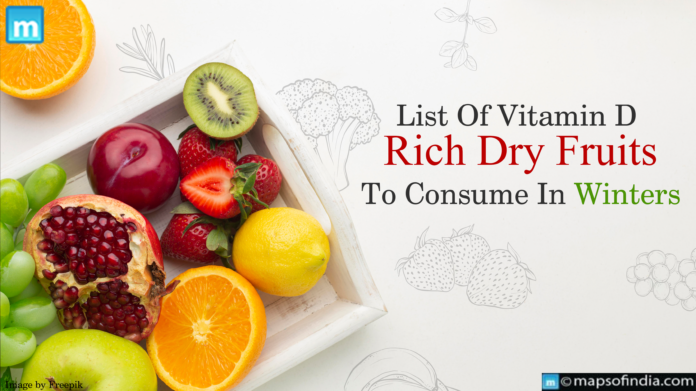Ensuring adequate vitamin D intake is vital for absorbing essential nutrients like calcium and phosphorus. Often referred to as the ‘sunshine vitamin,’ our skin naturally produces vitamin D when exposed to sunlight. However, sunlight may not be sufficient during the winter months to meet our vitamin D requirements. To bridge this gap, it becomes crucial to incorporate vitamin D-rich foods into our diet.
Enhancing Your Winter Diet with Vitamin D-Rich Dry Fruits
Let’s take a closer look at a variety of dried fruits that serve as excellent sources of vitamin D and present a diverse range of additional nutrients, making them particularly well-suited for inclusion in your winter diet. As we delve into the nutritional aspects of these fruits, we’ll discover how they can contribute to your vitamin D intake and overall well-being during the colder months.
-
Dried Figs
Among the various dried fruits, dried figs stand out as an exceptional source of vitamin D. Alongside this, they pack a punch with calcium and potassium, both instrumental in promoting bone health. Additionally, dried figs are high in dietary fibre, contributing to digestive well-being. Enjoy them as a delightful addition to your breakfast cereal, mix them into yogurt, or simply savor them as a convenient and nutritious snack.
-
Dried Apricots
Dried apricots emerge as another star in vitamin D-rich dry fruits. They offer a well-rounded nutritional profile, brimming with nutrients like vitamin A, potassium, and dietary fibre. Incorporate dried apricots into your diet by adding them to salads or relishing them as a standalone snack.
-
Dried Prunes (Plums)
Known for their digestive benefits, dried prunes or plums bring a unique combination of vitamins and minerals to the table. Rich in vitamin K and potassium, they contain vitamin D. Elevate your oatmeal experience by tossing in some dried prunes or munching on them as a tasty and nutritious snack.
-
Raisins
With their concentrated goodness, Raisins serve as an excellent source of iron and fibre, contributing to immune system support. Beyond that, they are rich in calcium, vitamin D, and phosphorus. Integrate raisins into your daily routine by incorporating them into smoothies or relishing them as a convenient and tasty snack.
-
Dates
Adding dates to the mix brings forth a delightful combination of vitamins C and D. Research indicates that the vitamin D and C content in dates can help maintain skin suppleness and address various skin disorders, such as rashes and itching. Enhance the nutritional value of your smoothies or snack time by including dates.
Including vitamin D-rich dry fruits in your winter diet cannot be overstated. While the mentioned dry fruits offer a substantial dose of vitamin D and other essential nutrients, it is advisable not to rely solely on them for your vitamin D needs. A holistic approach, encompassing sunlight exposure, fortified foods, and dietary supplements, is often recommended to meet vitamin D requirements. If concerns about vitamin D levels persist, seeking guidance from a healthcare professional is prudent, as they can provide personalized advice and, if necessary, prescribe vitamin D supplements tailored to individual needs.




